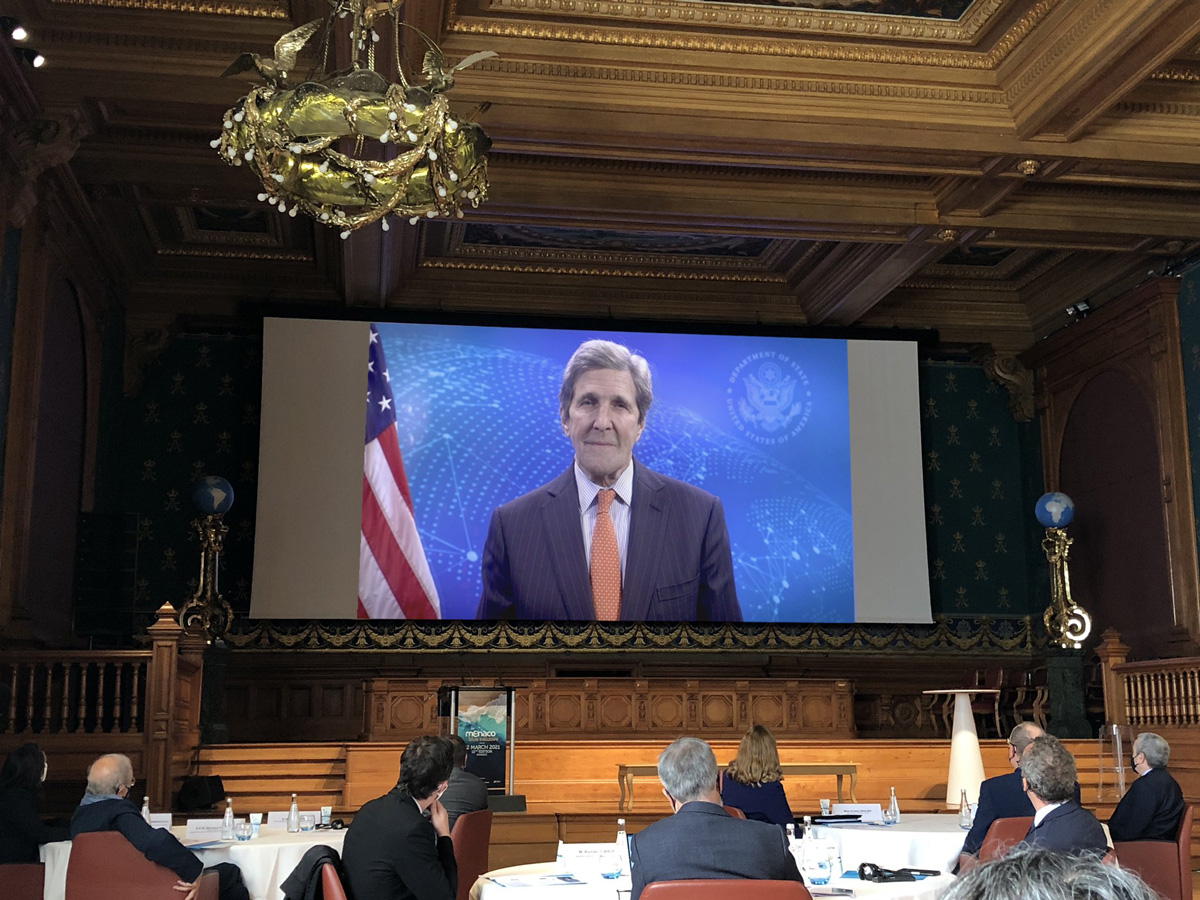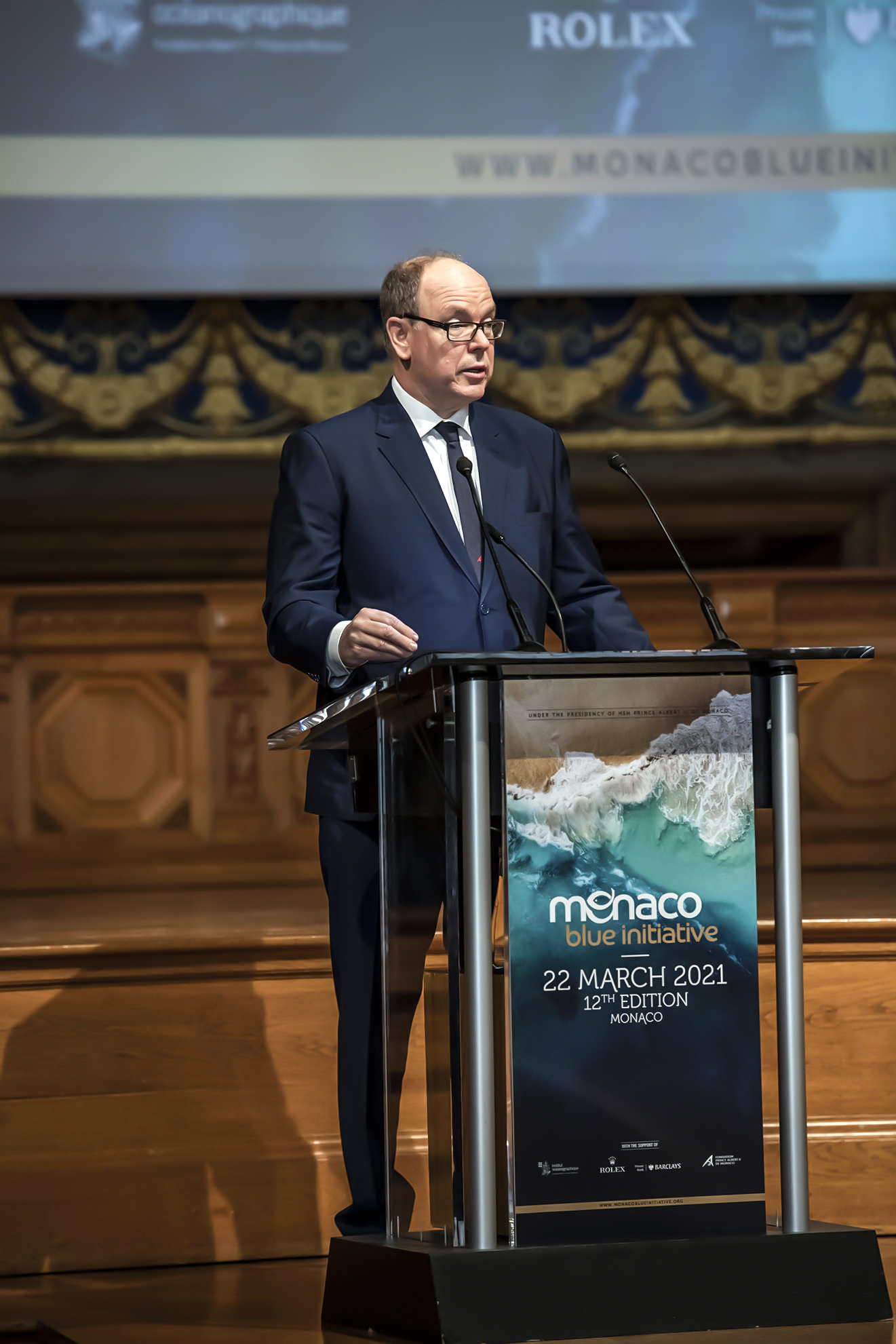conclusions of the 12th edition
The 12th edition of the Monaco Blue Initiative (MBI) took place on 22 March 2021 and brought together, around the blue economy and in a hybrid format, different players and decision makers in sustainable management and Ocean conservation.
The Vitality of the Planet and of the Ocean and the Vitality of the Economy Can Go Hand in Hand.
During this edition, not only representatives of governments, civil society and the private sector, but also international organisations and scientists shared this common conviction: the vitality of the Planet and of the Ocean and the vitality of the economy can go hand in hand!
Right from the start of his opening discourse, H.S.H. Prince Albert II of Monaco called for a general mobilisation, underscoring that “the best thing to do is to build dialogue between the various players concerned: to bring together knowledge, expertise and means, to build common diagnoses, ambitions and strategies.” Just when major meetings are on the agenda for 2021, as much on the subject of biodiversity preservation as on that of Ocean conservation, that is truly the ambition that must drive us.
John Kerry, U.S. Special Presidential Envoy for Climate, declared for his part that “We cannot combat the climate crisis without the potential of the ocean. The ocean is a source of sustainable climate solutions […] we need only to think of the jobs that such development would create. The fact is that we are facing the greatest economic transformation that the world has known since the Industrial Revolution.”

John Kerry, U.S. Special Presidential Envoy for Climate, declared for his part that “We cannot combat the climate crisis without the potential of the ocean. The ocean is a source of sustainable climate solutions […] we need only to think of the jobs that such development would create. The fact is that we are facing the greatest economic transformation that the world has known since the Industrial Revolution.”
Companies Must Engage in the Blue Economy With the Support of Science
In this perspective, the mobilisation of the private sector is vital; on the one hand as it is a tremendous breeding ground for jobs, but also because conservation needs to have the support of the means and tools of the private sector.
“National and international laws are not enough to solve the problems of sustainable development, and the ocean component is one of the most complex. The private sector, thanks to the principles of corporate social responsibility, has the capacity to support this paradigm shift.” explained Ricardo Serrão Santos, Portuguese Minister of Maritime Affairs.
To stimulate the engagement of the private sector and bring about a change in approach, we must broaden our perspective and take into account the “ecosystemic services” – non-monetary benefits – of the Ocean and give greater consideration to the long term benefits of a healthy ocean.
Throughout the day the need for players to complement each other in order to successfully protect the Ocean was highlighted again and again: political direction, the regulatory framework and the commitment of private players.
This cooperation must be based on a broad, shared and transparent knowledge of the Ocean. Science must be the link connecting the various actions, bringing together the diagnosis, the political impetus and the operational tools for each player. Science must aim not only to increase knowledge and data ; it must also shed light and provide indicators making it possible to better direct, influence and measure public and private actions.
New Tools for a Truly Sustainable Economy
There is an urgent need to develop a set of tools, decisions and management which will incorporate the major environmental and social goals and take into account the long term.
As to companies, they find it difficult to fix goals which are meaningful. Many of them feel “remote” from the Ocean: what impact can they have? How can they contribute to its protection?
A corner has been turned with corporate social responsibility, but commitment cannot be reduced to a marketing argument, to respond to a “bad conscience”; it must be at the heart of strategy in order to define sustainable development goals.
«“We need leaders in every sector of activity. Even if at first glance these sectors seem to be remote from the ocean, these leaders will chart the course, experiment and generate a cascade effect in the other companies in their supply-chain, their partners and even consumers. Attention to the ocean will be developed step by step”, summed up Robert Calcagno, Chief Executive Officer of the Oceanographic Institute of Monaco.
The financial sector can contribute by providing tools to evaluate the future and notably the risks: those that can be the consequences of climate change and the degradation of biodiversity and conversely the way in which nature-based solutions can reduce these risks (e.g. mangrove and coral reef preservation/restoration).
To this end, finance also needs accurate data on the state of the environment, the services rendered by nature today and models for predicting their future development.
“New mechanisms must be created to combine different sources of funding (public, private and philanthropic ) and the benefits which are also different in nature, whether monetisable or not. The Global Fund for Coral Reefs is a good example of this”, said by way of illustration Olivier Wenden, Vice President Chief Executive Officer of the Prince Albert II Foundation.
Matching Economic Recovery and the Preservation of the Ocean
Opening the MBI, H.S.H. Prince Albert II of Monaco announced that “Post-Covid recovery plans offer a window rare in history”.
For governments, taking into account the long term is the key to aligning the massive recovery plans which are emerging all over the world with the preservation of the Ocean and the Planet. It is not just about repairing the economy after Covid; it is also about building it for the decades to come.
“The blue economy must thus constitute one of the pillars of recovery. We need to rebuild better, and in blue!” declared Annick Girardin, French Minister of Maritime Affairs.
In addition, Virginijus Sinkevičius, European Commissioner for Environment, Oceans and Fisheries, added that “The blue economy will play a major role in our transformation; we will not meet the ambitions of the European Green Deal without the blue economy”.

Matching Economic Recovery and the Preservation of the Ocean
Opening the MBI, H.S.H. Prince Albert II of Monaco announced that “Post-Covid recovery plans offer a window rare in history”.
For governments, taking into account the long term is the key to aligning the massive recovery plans which are emerging all over the world with the preservation of the Ocean and the Planet. It is not just about repairing the economy after Covid; it is also about building it for the decades to come.
“The blue economy must thus constitute one of the pillars of recovery. We need to rebuild better, and in blue!” declared Annick Girardin, French Minister of Maritime Affairs.
In addition, Virginijus Sinkevičius, European Commissioner for Environment, Oceans and Fisheries, added that “The blue economy will play a major role in our transformation; we will not meet the ambitions of the European Green Deal without the blue economy”.
PRESS CONTACT
Prince Albert II of Monaco Foundation: Nadège Massé – nmasse@fpa2.org
Oceanographic Institute of Monaco: Émilie Vitale – e.vitale@oceano.org
